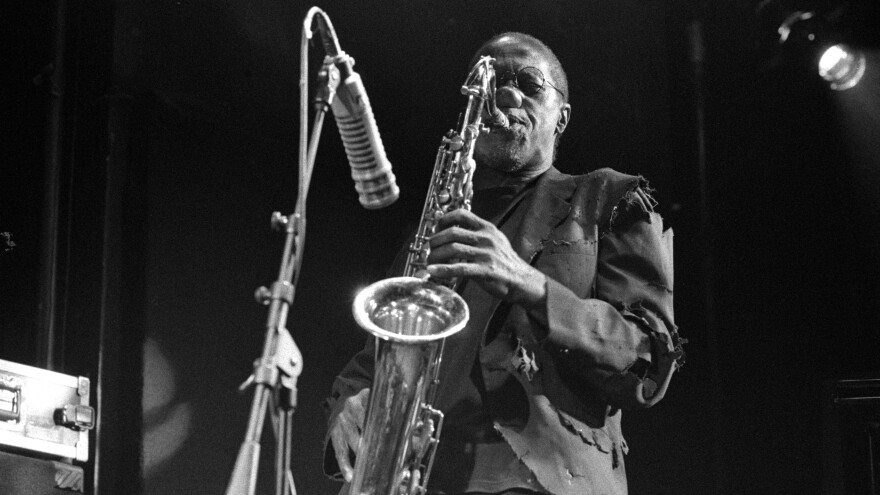Charles Gayle, the New York saxophonist who embodied a radical yet humble expression of freedom in his music, died Tuesday. He was 84.
His death was confirmed by dancer and Arts for Art founder Patricia Nicholson Parker. She had received word through Gayle's son, Ekwambu Gayle. "His immense genius was a gift to a suffering world," reads a joint statement with her husband, bassist William Parker. "Yet a healing music flowed like a river through him. Charles Gayle was a master musician for all time."
Gayle's sound on the tenor sax could be fierce and unruly. In his horn, subway cars rumbled, buses hissed, traffic screeched and sirens howled. For Gayle, he wasn't just playing or performing the streets; his music was a shaking reaction to and conversation with New York noise.
Gayle was born Feb. 28, 1939, in Buffalo, N.Y. Little is known about his personal life, but he did spend more than a decade homeless, playing for change on the streets and in the New York subway. In the mid-1980s, he started a Monday-night residency at the Knitting Factory, which led to albums released via Silkheart, FMP, ESP-Disk' and Black Saint, as well as on the venue's in-house label. He also found fans in New York's experimental rock scene, appearing on records by Blue Humans and Henry Rollins.
"You create your own path," Gayle told NPR in 2014. "I'm a risky person by nature."
A mythic and mischievous presence, Gayle created a character in the '90s named Streets, whom he'd conjure onstage with clown makeup and ragged clothes. He'd pantomime during sets, sometimes acting out violent scenes. Over time, the distinction between the two became blurred. Gayle named a 2012 album, an equal parts bracing and touching late-period work, for the character, and explained that he often felt Streets was with him even when offstage and out of makeup.
For Gayle, Streets created an outlet for deeper feelings to emerge. "It's acting out, to a degree, love, pain, joy and things that happen in life — it could be a situation like your heart is broke, and I'll tear hearts up and start crying, and try to play it on the piano, too, or the horn," he told Perfect Sound Forever in 1999. "It's just things that are in your heart, that's all I'm saying."
Like many of his peers, Gayle was inspired by saxophone iconoclasts Albert Ayler and John Coltrane. But rather than mimicry, you can hear an extension of those artists' spirits through his instrument.
"Charles was a legend, in a way," William Parker told JazzTimes in 2019, reflecting upon Touchin' on Trane, his 1993 album with Gayle and drummer Rashied Ali. "Musically he has this energy — an electric, acoustic, organic energy coming out of his horn. And everybody who heard it said you could hear all the history of the saxophone in there: Sonny Rollins, Albert Ayler, Coltrane. But it was Charles."
Gayle was a man of faith, sometimes confrontationally so. He'd give apocalyptic sermons onstage as his band breathed musical fire. Gospel music was as much of a touchstone as Coltrane. Many of his song and album titles came from or were inspired by the Bible: Repent, Consecration, Ancient of Days, Christ Everlasting. But ultimately, Gayle came to a place of peace in both faith and life. "It's been so beautiful," he told The Village Voice in 2012. "I'm past the word of happiness. I don't know that word too much 'cause it's happenstance, but it's certainly peace. I don't use the radio, I don't listen to music or have sound. I could just sit."
Copyright 2023 NPR. To see more, visit https://www.npr.org.




